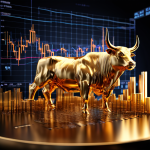
Equity Market Volatility: Expert Failures in the Face of Mass Psychology
Oct 14, 2024
Volatility is the heartbeat of the stock market—unpredictable, powerful, and often misunderstood. Every surge and crash is a testament to the complexity of market forces that no expert, however experienced, can reliably predict. But what drives these failures? The answer lies not just in the numbers but in the powerful influence of mass psychology, crowd behaviour, and the cognitive biases that even the most seasoned professionals fall prey to.
Behind the scenes, mass psychology governs market swings, often overriding data-driven predictions. Charles Mackay’s classic work Extraordinary Popular Delusions and the Madness of Crowds revealed the irrationality of group behaviour, which still shapes market bubbles and crashes today. Financial experts are not immune—blinded by overconfidence or anchored to outdated assumptions; they often struggle to foresee dramatic shifts.
The truth is that equity market volatility isn’t just an economic phenomenon; it’s a psychological one. Investors move in herds, analysts second-guess themselves, and the market moves with them. By understanding this interplay between psychology and the market, we uncover why the experts fail—and where investors can find an edge.
The Nature of Equity Market Volatility
Equity market volatility refers to the rate at which stock prices move up and down. This fluctuation is a natural part of market behaviour, influenced by various factors such as economic conditions, geopolitical events, and investor sentiment. While some degree of volatility is expected and even necessary for market function, extreme volatility can lead to significant challenges for investors and market participants.
Mass Psychology and Market Behavior
Volatility is often heightened by the irrationality of the crowd, a phenomenon Charles Mackay observed nearly two centuries ago in *Extraordinary Popular Delusions and the Madness of Crowds*. Gustave Le Bon further explored how individual logic collapses in the collective mindset, amplifying market swings. Investors, driven by fear or euphoria, create bubbles, then panic in herds, leading to crashes.
Even the most seasoned analysts fall prey to cognitive biases like overconfidence and anchoring. As Daniel Kahneman pointed out in Thinking Fast and Slow, experts often overestimate their ability to foresee future events, especially when past successes cloud judgment. Herding behaviour only exacerbates this problem, as professionals align with prevailing market sentiment, abandoning critical thinking for safety in numbers.
The concept of mass psychology in financial markets dates back to Charles Mackay’s 1841 work “Extraordinary Popular Delusions and the Madness of Crowds.” Mackay observed how groups of people could collectively behave irrationally, leading to market bubbles and crashes. This understanding of crowd behaviour remains relevant today, as mass psychology plays a significant role in equity market volatility.
Gustave Le Bon, a French polymath from the late 19th century, further developed the concept of crowd psychology. In his 1895 book “The Crowd: A Study of the Popular Mind,” Le Bon wrote, “In crowds, it is stupidity and not mother wit that is accumulated.” This observation highlights how collective emotion can overwhelm individual rationality, leading to exaggerated market movements and increased volatility.
The Failure of Expert Predictions
Why do experts frequently fail despite access to vast data and refined methodologies? Nassim Nicholas Taleb’s Black Swan theory offers a sobering perspective: rare, unpredictable events often shape markets far more than anticipated. These Black Swan events, by their very nature, defy prediction, yet they have an outsized impact on market volatility. No amount of expertise can fully anticipate these shocks.
James Surowiecki’s The Wisdom of Crowds suggests that collective intelligence can outperform individual experts, particularly in complex environments like the stock market. Market prices, which reflect the actions and opinions of millions, may better capture future movements than even the most confident forecast.
Despite their expertise and access to vast data, financial experts often fail to accurately predict significant market events or periods of heightened equity market volatility. This failure can be attributed to several factors:
1. Overconfidence Bias: Experts may overestimate their ability to predict market movements, leading to overly confident forecasts.
2. Anchoring Bias: Analysts may anchor their predictions on recent market performance or prevailing market sentiment, failing to account for potential shifts in market dynamics.
3. Herding Behavior: Even experts can fall prey to herding behaviour, aligning their predictions with the consensus view rather than challenging prevailing opinions.
Technical Analysis and Its Limitations
Experts often employ technical analysis, a method of predicting price movements based on historical market data, to forecast equity market volatility. While technical analysis can provide valuable insights, it is limited in predicting significant market events or shifts in investor sentiment.
John J. Murphy, a renowned technical analyst, acknowledges these limitations in his book “Technical Analysis of the Financial Markets” (1999). Murphy states, “The technical approach to investment is essentially a reflection of the idea that prices move in trends that are determined by the changing attitudes of investors toward a variety of economic, monetary, political, and psychological forces.” This recognition of the role of investor attitudes aligns with the importance of mass psychology in shaping market behaviour.
The Role of Randomness in Market Movements
Nassim Nicholas Taleb, a former options trader and author of “The Black Swan” (2007), argues that many significant market events are inherently unpredictable. Taleb’s concept of “black swan” events – highly improbable occurrences with massive impact – challenges the notion that experts can reliably forecast major market movements or periods of extreme equity market volatility.
When experts fail, contrarian strategies can thrive, exploiting the very inefficiencies created by mass psychology. For investors, embracing uncertainty—rather than trying to eliminate it—becomes the path forward. A balanced, disciplined approach, grounded in a long-term perspective and emotional resilience, may ultimately prove more effective than relying on expert predictions. As Benjamin Graham wisely observed, “The investor’s chief problem—and even his worst enemy—is likely to be himself.”
The Wisdom of Crowds vs. Expert Opinion
In his 2004 book The Wisdom of Crowds, James Surowiecki argues that under certain conditions, collective intelligence can outperform individual expert opinions. This concept suggests that market prices, which reflect the collective wisdom of all market participants, maybe more accurate indicators of future market movements than individual expert predictions.
The failure of experts to consistently predict market movements creates opportunities for contrarian investors. Sir John Templeton, a pioneering global investor, famously said, “Bull markets are born on pessimism, grow on scepticism, mature on optimism, and die on euphoria.” This observation highlights the potential for contrarian strategies to capitalize on market inefficiencies created by mass psychology and expert failures.
The Role of Central Banks in Market Volatility
Central banks play a significant role in influencing equity market volatility through monetary policy decisions. Alan Greenspan, former Chairman of the Federal Reserve, noted in his 2007 memoir “The Age of Turbulence” that “Uncertainty is not just an important feature of the monetary policy landscape; it is the defining characteristic of that landscape.” This acknowledgement of uncertainty underscores the challenges experts and central bankers face in predicting and managing market volatility.
Interestingly, the challenges of predicting market movements and understanding mass psychology have parallels in ancient wisdom. The I Ching, or Book of Changes, an ancient Chinese divination text dating back to around 1000 BC, emphasizes the importance of adapting to change and recognizing the cyclical nature of events. This ancient perspective offers a valuable counterpoint to modern attempts at precise market prediction.
The Future of Expert Analysis and Market Prediction
As technology advances and our understanding of market dynamics improves, the role of experts in analyzing equity market volatility continues to evolve. Machine learning and artificial intelligence are increasingly employed to analyze vast amounts of data and identify patterns that may elude human analysts. However, the fundamental challenges of predicting human behavior and market psychology remain.
Strategies for Investors in a Volatile Market
Given the limitations of expert predictions and the influence of mass psychology on equity market volatility, individual investors may benefit from adopting a more balanced approach to investing. This could include:
1. Diversification: Spreading investments across different asset classes and sectors to mitigate the impact of market volatility.
2. Long-term Perspective: Focusing on long-term investment goals rather than short-term market fluctuations.
3. Emotional Discipline: Developing strategies to manage emotional reactions to market volatility and avoid impulsive decision-making.
4. Continuous Learning: Staying informed about market trends and economic conditions while maintaining a healthy scepticism towards expert predictions.
Conclusion: Embracing Uncertainty in Equity Markets
Experts’ failure to consistently predict equity market volatility amidst the powerful forces of mass psychology highlights the inherent uncertainty of financial markets. Rather than relying solely on expert opinions or attempting to predict short-term market movements, investors may be better served by developing a robust, long-term investment strategy that acknowledges the unpredictable nature of markets.
As Benjamin Graham, the father of value investing, wisely noted, “The investor’s chief problem – and even his worst enemy – is likely to be himself.” This observation underscores the importance of managing one’s psychology and biases when navigating the challenges of equity market volatility.
By understanding the limitations of expert predictions, the influence of mass psychology, and the role of cognitive biases in decision-making, investors can develop a more nuanced and resilient approach to investing in volatile markets. Ultimately, success in the face of equity market volatility may come not from attempting to predict the unpredictable but from developing the wisdom to adapt to changing market conditions and maintain a disciplined, long-term perspective.












